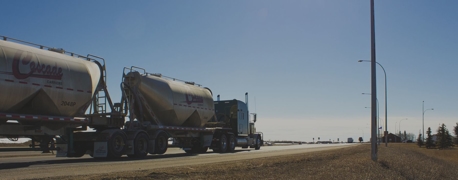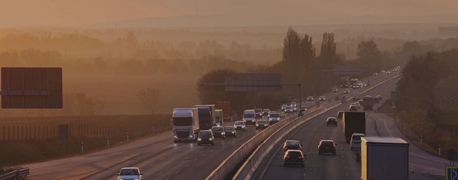Requirements for Truck Insurance

Just like a driver of a small vehicle is required to carry a minimum level of insurance in order to drive, commercial trucking companies are also required to carry a minimum level of insurance in order to operate. This is for good reason. Large 18-wheelers are heavier and larger than just about every other type of vehicle on the road. So, when a semi is involved in an accident, the damage can be catastrophic thanks to the difference in size between the vehicles involved. In other words, a large truck can cause injuries and property damage that are much more serious and expensive than if all vehicles in an accident were similar sizes.
Federal Trucking Insurance Requirements
To make sure that truck accident survivors can receive the compensation they need, laws exist that place mandatory coverage amounts on large trucks. The Federal Motor Carrier Safety Administration (FMCSA) has created mandatory coverage minimums for trucks that are based on what type of material they haul. In addition to complying with federal trucking insurance requirements, truck companies and truck drivers should ensure they are in compliance with applicable state requirements. These may vary depending on the jurisdiction.
Mandatory FMCSA insurance minimums for trucks include the following:
- $300,000 for trucks that are under 10,001 pounds and that don’t haul hazardous materials
- $750,000 in coverage for trucks that are over 10,001 pounds and that don’t haul hazardous materials
- $1,000,000 in coverage for private drivers and companies that haul oil
- $5,000,000 in coverage for trucks that haul hazardous material other than oil
Other Types of Trucking Insurance Requirements
Understanding trucking insurance requirements and what applies to your vehicle and cargo will be an essential part of staying protected on and off the road.
Cargo Insurance
This type of insurance covers the cargo you're hauling. The amount of cargo insurance required for a tractor-trailer or 18-wheeler will depend on the type and amount of goods it is hauling.
Bobtail Insurance
Bobtail insurance covers a truck and driver after a load has been delivered. Having coverage for a trucker and vehicle when they are not hauling a load is just as important as having coverage when a trailer is fully loaded.
Physical Damage
This covers a semi-truck for any physical damage that may occur.
Limited Depreciation Coverage
Because insurance may only cover the fair market value of a vehicle, which could be less than what a trucker or trucking company owes, limited depreciation coverage can cover the gap and cover the cost to replace the vehicle.
Mechanical Breakdown Insurance
This type of trucking insurance covers out-of-pocket costs for repairs, which can be extremely expensive in some cases.
Non-Trucking Liability Insurance
This covers accidents or damage that occur if a truck is being used for non-business purposes or if a driver is using it on their day off.
On-Hook Coverage
When a truck is towing or hauling another vehicle, on-hook coverage will provide for damage that may occur to that vehicle in an accident.
Can Truck Carriers Set Their Own Minimums?
Yes. A truck carrier can require an independent contractor to have more coverage than the law requires before allowing them to do work for it. This precaution is taken to help them ensure that the driver has enough insurance for the specific demands of the type of freight they’re hauling. Additionally, some carriers require truckers to carry optional coverage, such as cargo insurance. Since this coverage is not required by law, a carrier can set this requirement according to their preference.
Are Truck Insurance Minimums Enough for Accident Survivors?
In the 1980s, the Motor Carrier Act set many of the requirements for trucking insurance. The minimum level has not been adjusted since the bill was passed and the FMCSA has acknowledged that, because of, inflation and higher cost of medical care, $750,000 is no longer adequate to cover damages caused by commercial trucking accidents.
Six years ago, the FMCSA released a report revealing that if the minimum amount of $750,000 in coverage for large trucks had kept up with inflation, it would be about $1.62 million today. Notably, this doesn't factor in the accelerated rise of healthcare costs over the past two decades. Since the report, a House panel has attempted to amend the four-decade-old law to account for inflation.
According to Representative Jesus “Chuy” Garcia of Illinois, the change is crucial to produce “... minimum insurance required for commercial vehicles to support families recovering from crashes."
Our Firm Helps Truck Accident Survivors Obtain the Compensation They Need
When truck companies aren’t safe and insurance companies don’t offer the compensation accident survivors need, Arnold & Itkin steps in to demand answers. We’ve recovered billions of dollars by never settling for less than clients need. When the other side isn’t fair, we hold them accountable. When insurance companies aren’t ready to help, we demand they treat clients better.
If you’re struggling after a truck accident, we’re ready to help. Call us today to find out how we can fight for the compensation you need. We’re standing by to answer your questions during a free consultation at (888) 493-1629
- Categories


